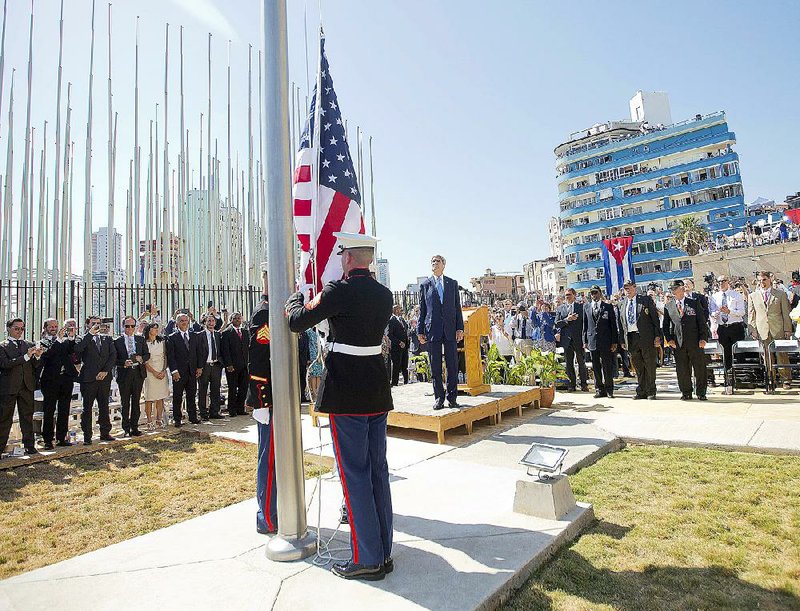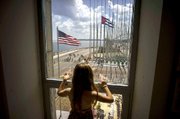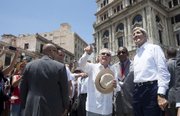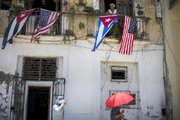HAVANA -- Jubilant crowds waved U.S. flags and chanted "Long live the United States" as the Stars and Stripes rose over the newly reopened U.S. Embassy in Cuba on Friday after a half-century of often-hostile relations.
Secretary of State John Kerry celebrated the day but also made a nationally broadcast call for democratic change on the island.
Hundreds of Cubans mixed with U.S. tourists outside the former U.S. Interests Section, newly emblazoned with the letters "Embassy of the United States of America." They cheered as Kerry spoke, the United States Army Brass Quintet played "The Star-Spangled Banner" and U.S. Marines raised the flag alongside the building overlooking the Malecon seaside promenade.
After more than half a century "suspended in the amber of Cold War politics," Kerry said, "the time has come for us to move in a more promising direction."
Meeting more than 54 years after the severing of diplomatic relations, Kerry and Cuban Foreign Minister Bruno Rodriguez set an early September date for the start of talks on full normalization of a relationship long frozen in enmity.
Kerry, the first secretary of state to visit Cuba in 54 years, and Rodriguez acknowledged that their nations would continue to disagree over issues such as democracy and human rights, but they also said they hoped to make progress on issues ranging from maritime security and public health to the billions of dollars in dueling claims over confiscation of U.S. property and the U.S. economic embargo on the island.
Their meeting was marked by direct comments from both leaders.
"We remain convinced the people of Cuba would be best served by a genuine democracy, where people are free to choose their leaders, express their ideas, practice their faith; where the commitment to economic and social justice is realized more fully; where institutions are answerable to those they serve; and where civil society is independent and allowed to flourish," Kerry said. He spoke before an audience of Cuban and U.S. diplomats on the embassy grounds in an event that was broadcast live on television across Cuba.
After the ceremony, in addressing reporters with Kerry, Rodriguez responded with comments on U.S. human-rights transgressions -- from police shootings of black men to mistreatment of prisoners at Guantanamo Bay, the U.S. naval base that Cuba says must be returned.
"Cuba isn't a place where there's racial discrimination, police brutality or deaths resulting from those problems," Rodriguez said. "The territory where torture occurs and people are held in legal limbo isn't under Cuban jurisdiction."
Many Cubans disagree with that assessment, including Afro-Cubans who say discrimination is still rampant despite the revolution's egalitarian ideals, and human-rights groups who say regular, short-term arrests of government opponents aim to intimidate dissent and include beatings.
But Kerry told reporters there are many concerns that can be advanced, involving matters such as civil aviation, maritime security, counternarcotics efforts and the environment, as well as financial claims asserted by both sides. Such progress would yield benefits for citizens in both nations, he said.
Since January, Kerry said earlier at the U.S. Embassy, travel from the U.S. to Cuba has increased 35 percent and "more and more U.S. companies are exploring commercial ventures here that would create opportunities for Cuba's own rising number of entrepreneurs."
Many Cubans lauded Kerry's call for changes, including greater access to technology on an island with one of the world's lowest rates of Internet penetration. They paired their praise with calls for the United States to lift the 53-year-old trade embargo and allow easier travel between the two countries.
"More democracy, elections, we hope for that to come with this diplomatic opening," said Julio Garcia, 51, who works as a mechanic.
Self-employed graphic designers Danay Lopez, 28, and her husband, Yosvel Martinez, 32, watched the ceremony with their 3-year-old son, singing both countries' national anthems and shouting "Long live Cuba" and "Long live the United States" as the event drew to a close.
"Kerry spoke about democracy, freedom, Wi-Fi, and he's right," Lopez said. "We want all that to be freed up, but [also] for the U.S. to free up travel, and I don't want my son to live under the embargo."
Hard fight ahead
Kerry acknowledged that President Barack Obama's administration would have a difficult fight in Congress to end the U.S. trade embargo of Cuba so that normal business ties between the two countries could resume.
"President Obama is clearly moving to get the embargo out of the way," which would be an "enormous" step, Kerry told reporters. "There is no way Congress will lift the embargo if we are not making progress on issues of conscience."
Obama also called for change in Cuba when he announced the new U.S. policy of engagement in December, but his words were less pointed than Kerry's in Havana.
Leaders of the Republican-led Congress have vowed to maintain the embargo and also have said they will block confirmation of an ambassador to serve in Havana. Career foreign service officer Jeffrey DeLaurentis will continue to serve as chief envoy for now.
Republican presidential contender Marco Rubio, a Cuban-American senator from Florida, has been one of the more vocal opponents of the entente. At a campaign event in New York, he said he would reverse the White House administration's new Cuba policy on his first day in office, arguing it gives Cuban President Raul Castro's government international legitimacy and more resources to repress its people.
But Kerry said at the embassy that "Cuba's future is for Cubans to shape."
The White House administration doesn't plan to seek changes in immigration rules that permit almost all Cubans who reach U.S. soil to stay and apply for residency, Kerry said. Cuba opposes that policy. Meanwhile, Cuba's demands to reclaim the Guantanamo base, which the U.S. has held for more than a century, "are not on the table," Kerry said.
After speaking to reporters with Rodriguez, Kerry briefly walked Old Havana's historic Plaza de San Francisco with Havana City Historian Eusebio Leal, stopping to look in shops and greet local residents and store owners before heading to an afternoon flag-raising at the home of the embassy's chief of mission.
He addressed a group of diplomats, Cuban-Americans and advocates of diplomacy with Cuba before a trio of Marines raised the Stars and Stripes in the stately home's back garden. The event was attended by dissidents including Jose Daniel Ferrer, Miriam Leiva and Yoani Sanchez, who tweeted a selfie with Kerry and a photo of the secretary of state meeting privately with a group of dissidents.
The dissidents were not invited to the embassy ceremony, avoiding tensions with Cuban officials who typically boycott events attended by the country's small political opposition.
Soon after Kerry was heading home Friday evening, diplomats who negotiated the July 20 embassy reopening were to start full-time discussions of how to bring about measures such as re-establishing direct flights and mail service.
3 Marines return
Three Marines who took part in the flag-lowering in 1961 handed over the new flag to Marines who raised it Friday.
Jim Tracy, Mike East and Larry C. Morris received a standing ovation at the seaside diplomatic mission as they handed a folded flag to three active Marines.
Kerry lauded the men for their composure during a tense moment, in 1961, when they emerged from the building to find a large crowd between them and the flagpole.
"No one felt safe. But the Marines had a mission to accomplish. And slowly, the crowd just parted in front of them as they made their way to the flagpole, lowered Old Glory, folded it and returned to the building," Kerry said.
He added that the Marines vowed back then they would return to raise the flag, although nobody could have imagined how many years would pass.
"This is your cue to deliver on words that would make any diplomat proud," Kerry said, "just as they would any member of the United States Marine Corps: Promise made, promise kept. Thank you."
In comments published on a U.S. State Department blog post, East recalled the moment when Washington and Havana broke off diplomatic relations at the height of the Cold War.
"It was a touching moment," East said. "To see Old Glory flying for the last time in Cuba, it .... just didn't seem right."
Morris said he had been stationed on the island for just 4 1/2 months, but he "enjoyed the people and Cuba better than any place I've ever been."
Cuba formally reopened its Washington embassy last month. The U.S. raised its flag in Havana then, too, though saving the formal ceremony for Kerry's visit.
Information for this article was contributed by Bradley Klapper, Michael Weissenstein, Anne-Marie Garcia, Andrea Rodriguez and staff members of The Associated Press and by Indira A.R. Lakshmanan, Terry Atlas, Ezra Fieser, Sahil Kapur and Michael Smith of Bloomberg News.



